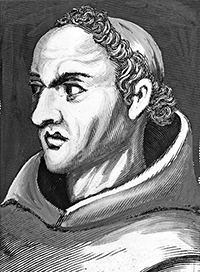

If anyone should like to recall me or anyone else who has turned away from the obedience of the false Pope and his friends, let him try to defend his Constitutions and sermons, and show that they agree with Holy Scripture, or that a Pope cannot fall into the wickedness of heresy, or let him show by holy authorities or manifest reasons that one who knows the Pope to be a notorious heretic is obliged to obey him. For against the errors of this pseudo-Pope I have turned my face like the hardest rock, so that neither lies nor calumnies nor any persecution (which cannot touch my innermost self in any bodily fashion), nor great numbers of men who believe in him or favor him or even defend him, shall be able to prevent me from attacking or reproving his errors, as long as I shall have hand, paper, pen, and ink. In proof thereof several volumes have been published. For men of great learning showed me that because of his errors and heresies the same pseudo-Pope is heretical, deprived of his papacy, and excommunicated by Canon Law itself, without need of further sentence. 12), defending his opposition to Pope John XXII, who opposed the (then-material) dogma that the souls of the deceased destined to heaven behold the Beatific Vision immediately after death, defined by John XXII's successor Benedict XII in Benedictus Deus-that: Quote from: OckhamBecause of the errors and the heresies mentioned above and countless others, I turned away from the obedience of the false Pope and all who were his friends to the prejudice of the orthodox faith. Ockham wrote-"at the end of his letter to the General Chapter in Assisi in the spring of 1334" (cf.

The following quote from Salza & Siscoe's True or False Pope?: Refuting Sedevacantism and Other Modern Errors p. 394 ff., which shows how the Great Western "Schism" lead to the adoption of Ockham's nominalism, despite its weakness).īut was Ockham really a sedevacantist (i.e., one not explicitly against the papacy per se but against a particular pope claimant) ? Thomist John Deely's Four Ages of Understanding p.

Spade) invented his dead-end nominalist philosophy in order to justify his being against the papacy (cf. this article on him by the Catholic logician Paul V.


 0 kommentar(er)
0 kommentar(er)
